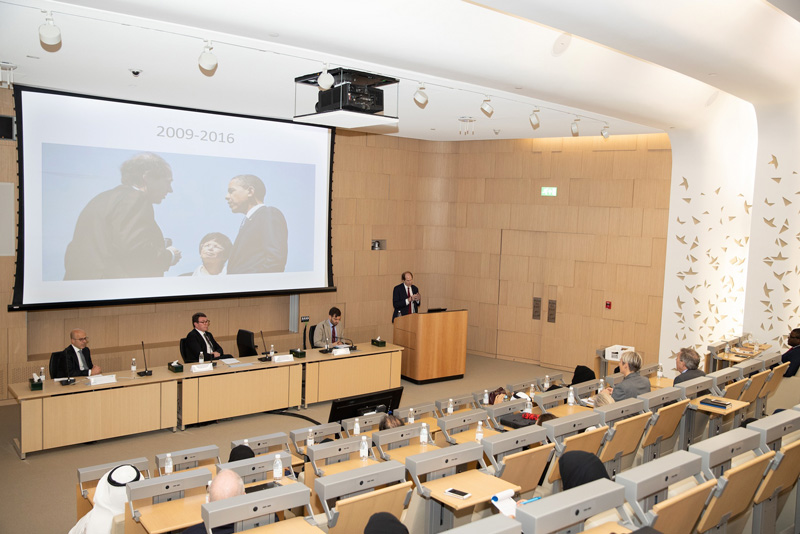
Hamad Bin Khalifa University’s (HBKU) College of Law and Public Policy (CLPP) recently hosted a public lecture on “Nudging and Beyond: From Behavioral Economics to Public Policy.”
The lecture, which was held in collaboration with the Supreme Committee for Delivery and Legacy’s Qatar Behavioural Insights Unit, was delivered by Harvard University Professor Cass R. Sunstein. Sunstein was the administrator of the White House Office of Information and Regulatory Affairs during the Obama Administration. He is also the founder and director of the Program on Behavioral Economics and Public Policy at Harvard Law School and co-author of “Nudge: Improving Decisions about Health, Wealth, and Happiness”.
This lecture also introduced the concept of “nudging” and highlighted its implications in health, economic, legislation, education, and civil life. The term “nudge” holds political and economic connotations as it uses positive reinforcement and introduces indirect suggestions to change individual or group behavior and decision making in an easy and low-cost way. Policy makers working to change people’s behavior and alter their decisions may be more effective using a “nudge” rather than legislation or direct enforcement to improve the life and wellbeing of people and society.
In this lecture, Sunstein discussed the effectiveness of behaviorally informed interventions to regulate lifestyle choices, as well as the legitimacy of the adoption of “nudging” programs to promote healthier lifestyles. One of the greatest challenges of contemporary societies, including the Gulf region, he noted, are lifestyle choices and eating habits that lead to obesity, heart disease, and diabetes. For this reason, using “nudge” methods could play an active role by adopting policies for a healthier lifestyle.
“There is a long-term interest in this country, as in many countries, for improving health and increasing exercise and activity on the part of young people,” he said. “Qatar is also witnessing an increased trend in entrepreneurship to provide various leisure facilities. This might involve information and reminders to people, as well as instilling the culture of sports holidays, which can lead people to choose and engage in actions that will make their lives better.”
Professor Clinton Francis, founding dean of CLPP, said that the college was “honored to have Professor Sunstein deliver this important lecture that can help Qatar navigate its future in some of the leading behavioral economics.”
Francis noted that Supreme Committee for Delivery and Legacy’s Qatar Behavioural Insights Unit also works actively on a number of experiments for enhancing policy areas that relate to education, workers’ welfare, environmental sustainability, and healthy lifestyles. This policy experimentation will pave the way to developing new policies that will lead Qatar and the region towards a better future, in line with the goals of the Qatar National Vision 2030.
HBKU is a member of Qatar Foundation for Education, Science, and Community Development. The University organizes public lectures throughout the year on trending topics that are of paramount significance to the Qatar community. Wide selections of other activities are currently open for registration to the public and will all be hosted at Education City.





